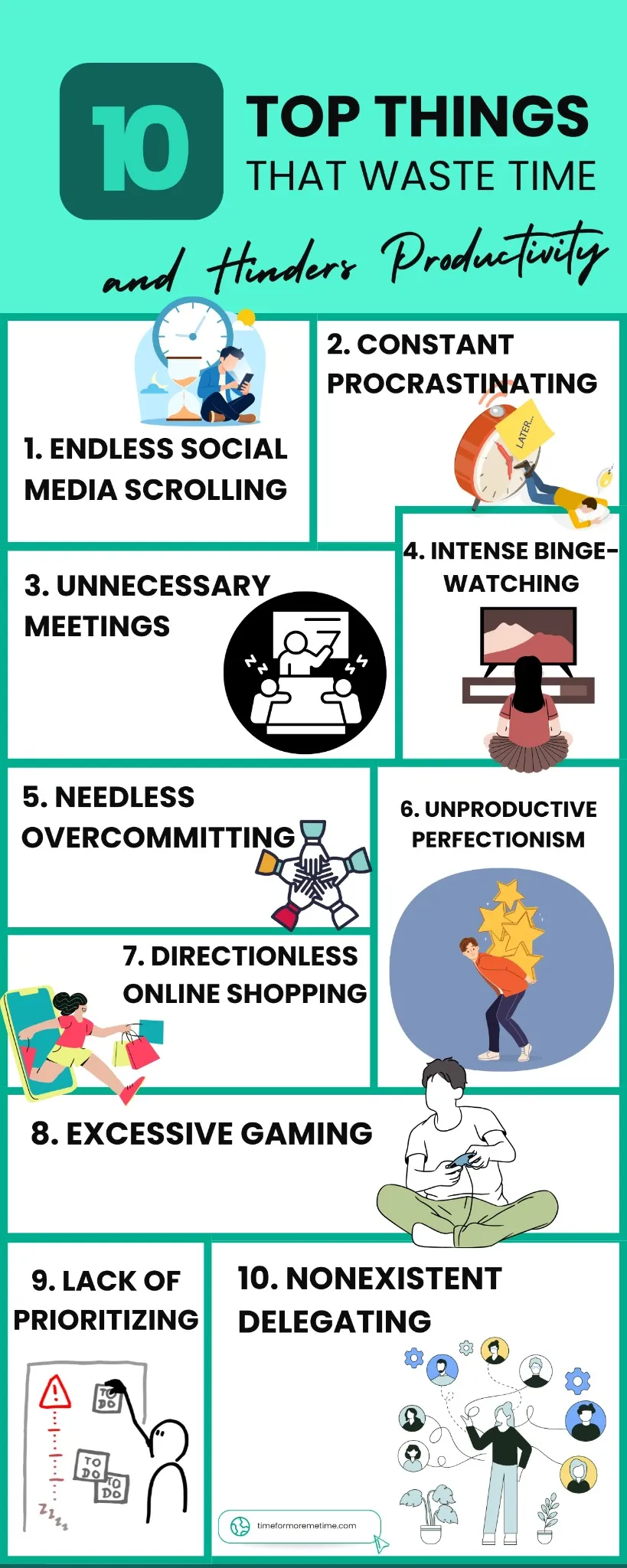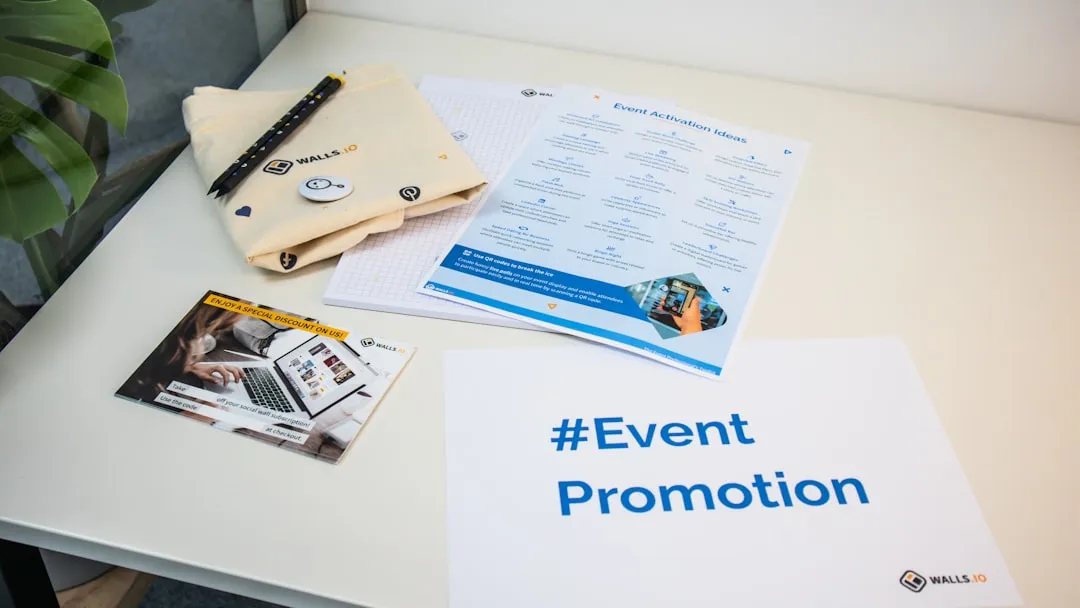
It’s almost bedtime, and you’re lying there, asking yourself, “Where did the day go?” Sound familiar? We’ve all been there. When I got my second job, this became a nightly routine. After just a week, I’d find myself staring at the ceiling, wondering how the day slipped away.
You know that feeling—as you settle into bed, a pang of guilt creeps in, reminding you that you didn’t accomplish what you set out to do. It’s frustrating, but it’s also a clear sign something is eating away at your productivity: time wasters.
And here’s the funny part—in my case, I was spending most of my time at work. So why did I still feel guilty?
The answer hit me after some thought. Sure, I was working hard, but what about those moments I got sidetracked? Maybe it was endless scrolling through social media—those adorable animal videos are hard to resist—or falling into a never-ending internet rabbit hole.
It turns out, those seemingly small distractions were stealing hours from my day without me even realizing it. And if you’re feeling the same way, chances are, it’s happening to you, too.
Whether you’re juggling work deadlines, family responsibilities, or personal goals, identifying what’s wasting your time is the first step toward reclaiming it. Awareness is key to breaking free from unproductive habits and making the most of your day.
But here’s the thing: Before you can find solutions, you have to pinpoint the real problems.
What are the top things that waste your time and hinder your productivity? By recognizing these common pitfalls, you’ll be better equipped to tackle them head-on and take back control of your time. Let’s get started!
1. Endless Social Media Scrolling

We’ve all done it. Even in the middle of a task, I often find myself grabbing my phone to quickly check a notification. But that was ages ago when I didn’t know these things that waste time.
When this happens, the next thing we know, an hour is gone.
We’ve scrolled through countless memes, cute puppy videos, and targeted ads without even realizing it. This is a huge time-waster, especially when we’re trying to save time, build a side hustle, or make extra money.
Think about how much time you spend on social media daily. Now, think about how much more productive you could be if you cut that time in half—or cut everything completely. You could invest that time in your online business, learn a new skill, or even just take a break and relax.
The first step to stop wasting time on social media is to be mindful of your usage. Here are things I did when I realized my excessive social media usage:
Setting time limits on my apps.
Scheduling specific times of day to check my feeds.
Disabling notifications of social media apps so I’m not constantly being pulled back in.
Unfollowing accounts that don’t bring me joy or add value to my life.
Turning off my smartphone is one of the best remedies to ensure I don’t get sidetracked with notifications.
Doing these actions helped me practice responsible social media use. I no longer scroll mindlessly, which may even lead to negative emotions when I see the “perfect” lives of these people on social media.
2. Constant Procrastinating

Everybody procrastinates. Everybody, at one point, said “I am bored.” Who hasn’t? We all do it. But when we need that extra money time, we don’t have the luxury for it!
Procrastination sucks the life out of your goals. It whispers sweet lies, like, “You’ve got plenty of time,” or “Just one more episode.” You get to check useless websites just to pass the time.
But don’t listen! Those are time-wasting traps, my friend.
You need to be laser-focused and let go of this time killer. Think about your goals—really think about them. You want to be financially free, right?
Then you have to fight for it. That means kicking procrastination to the curb. This is your time, and you’re not going to waste it. And here’s how you can keep procrastination away:
Start by breaking down big tasks into smaller, less scary ones. This makes it way easier to get started.
And what I don’t forget is to celebrate my small wins! Whenever I finish a small part of that big project, I pat myself on the back and indulge myself with a steak or wine. Do anything that will encourage you to keep going—if this worked for me, I know it will also work for you.
Also, try to figure out what makes you procrastinate. Are you scared of failing? Do you get distracted easily? Once you know what your triggers are, you can find ways to beat them. For example, I know I waste a lot of time on social media, so I used a website blocker. This helped me stay focused on my work.
Simple right? However, controlling procrastination requires a lot of discipline. But you can do this! And if you can’t help it, try to find a good website to cure boredom fast, to lessen the amount of time you procrastinate!
3. Unnecessary Meetings

We’ve all been there, stuck in a meeting that feels like a total waste of time. Sometimes, work seems to try to solve every problem with another meeting, but meetings should be the last resort, not the first option.
And let me be straight with this: meetings are just daily timewasters.
Currently, I’m thankful that I’m free of this with my current jobs. And this is the same when it comes to my team managing this website. We don’t have scheduled meetings. We talk and work as we go. I don’t want to waste everyone’s time!
Think about it: meetings eat up time you could use for other tasks—spend more time with your family, visit a shop you’ve been planning for a long time, or have a movie date with your partner.
That’s why, before you send out another meeting invite, ask yourself if you can handle a situation in your work with a quick email or a phone call. If a message or quick call will suffice, you can save everyone time and boost productivity.
This is super important for digital nomads or online entrepreneurs because time management methods are vital when you’re building a business.
4. Intense Binge-Watching
Binge-watching can be a lot of fun, and I can’t deny that. However, it often comes with unhealthy consequences.
We all love to unwind with our favorite shows on our favorite cool websites, but it’s all too easy to get sucked in, leading us to spend hours in front of the screen and eating away at our free time.
Consider what you could accomplish with that time instead. You could learn a new skill, start a side hustle, or even build a business. It’s worth reflecting on.
Beyond just the time wasted, binge-watching has other drawbacks. Eventually, you’ll run out of shows to watch. Instead of savoring the joy of one episode each week, you might find fleeting happiness in binge-watching an entire season in a single day. It’s inefficient, isn’t it?
What if you limit your TV time to just a few hours a week?
That extra time could be dedicated to pursuing your passions or exploring online entrepreneurship—something you’ve always wanted to learn about. By making this small change, you could transform your leisure time into an opportunity for growth.
5. Needless Overcommitting

We’ve all been there, especially if you’re like me, who’s always happy to help everyone. Someone asks you to help with something, and because you’re a good person or a people pleaser, you say “yes.”
The result? You get overloaded, start feeling stressed, and might even miss deadlines. This is over-committing, and it’s a huge time-waster.
I used to struggle with this all the time.
I volunteered for everything, took on extra projects at work, and agreed to help friends with anything they needed. But it became too much. I was always exhausted and never had time for myself.
So, I decided to make a change. Here’s how I avoided overcommitting:
Think before you commit: I take some time to consider my schedule and how this new commitment might fit in.
Don’t be afraid to say no: I turn down requests if I don’t have the time or if they don’t align with my goals.
Set boundaries: Letting people know my limits also helped. If I can only help out on certain days or for a limited amount of time, I let them know.
The result? I had more time to do the things that matter most to me. No more stress for having a lot on my plate! I’ve been a lot happier since then. Why not try it, too?
6. Unproductive Perfectionism

You know that saying, “Practice makes perfect?” Well, I’m here to tell you, as a reformed perfectionist, that’s a big ol’ time waster! I used to get lost in the weeds, trying to make every blog post, every social media update, and every single thing I did absolutely perfect.
But guess what? It usually meant I got hardly anything done!
One example? I’d spend hours, sometimes days, obsessing over the perfect headline for a blog post. I’d tweak it, rewrite it, then go back to the original. All that time, I wasn’t actually writing the post!
It was like I was stuck in a productivity black hole.
So, what did I do?
I made a decision. I started setting time limits for tasks. If it was a blog post headline, I gave myself 30 minutes.
That’s it! And you know what? The world didn’t end. My posts still got read, and I actually started getting more done.
Another thing I did was stop comparing myself to others.
Everyone’s on their own journey, right? There’s always going to be someone with a better website, a funnier Instagram post, or a bigger email list. But focusing on them just stole my joy, and I wasted so much time, to be honest.
7. Directionless Online Shopping

Excessive online scrolling to shop for “things I might need” is one of the things that waste time—and thankfully, I was able to eliminate that.
No matter when you’re bored or just relaxing, browsing online for things you don’t need will only help you lose track of time. An hour disappears as you check out deals on clothes you’ll never wear, gadgets you don’t understand, and kitchen tools you’ll use once—maybe.
This is how online shopping, without an ongoing shopping list, can really eat up your time.
And it’s not just the browsing! Think about the minutes wasted comparing prices, creating accounts, and entering payment info. Then there’s the anticipation of waiting for your package.
All that for something you didn’t even want in the first place. Not only did you spend time, but you’ve also wasted money.
So, before shopping online, I started making a list. If it wasn’t on the list, I wouldn’t let myself get it. This simple trick saved me a bunch of time and money! I realized I was less tempted to browse aimlessly because I had a plan.
8. Excessive Gaming

While playing games can help you earn money, it’d be one of the things that waste time if done excessively. But when you’re disciplined and use your time wisely, you can make gaming worthwhile.
When you spend a lot of time gaming, and I mean A LOT, it becomes a huge time-waster.
I had dreams of making extra money online and becoming a digital nomad. But, let’s be real, those dreams weren’t going to happen sitting on my butt playing video games all day.
If you’re like that, you have to make a change.
What I did to ensure that I didn’t waste time playing video games or online games was to have a specific screen time. I limited myself to only gaming a couple of hours a day. This was tough, but I did it!
Then, I decided to only play on weekends or at a specific time to have fun. This freed up so much of my day. I could focus on side hustles, learn new skills, or just relax and recharge without staring at a screen.
It wasn’t easy, but it was worth it. If you’re serious about saving time and reaching your financial goals, take a look at how much precious time you spend gaming. You might be surprised how much time you can free up by cutting back.
If you can’t stop, try to control the amount of time you spend on games and work. With this one, you can take advantage of the Pomodoro method. Or, you can try to do something else. Try to find stuff to do when bored aside from gaming.
9. Lack Of Prioritizing

Not having priorities is like wandering through a giant supermarket with no shopping list. When I was younger, I did things without a plan—no set goals, no intentional life. Thus, I usually ended up with trial-and-error way of doing things.
But when I started to practice making plans, I knew my priorities. If I don’t decide what’s most important, I’ll find myself constantly busy but not making much progress on what really matters.
For example, when I first started blogging, I would jump at any article that came my way. This meant I was writing on unimportant topics when I should have been focusing on relevant, helpful articles. I was constantly stressed and not making the kind of money I wanted.
I realized I needed to prioritize.
I started by writing down my goals: earn more money, have more free time, and create a site to help other people enjoy the luxuries I have now.
Then, I looked at all my specific tasks and asked myself, “Does this help me achieve my goals?” If the answer was no, I either delegated it, postponed it, or just said no.
10. Nonexistent Delegating

Have you ever experienced this? You’re swamped, but explaining a task to someone else seems more time-consuming than doing it yourself. This, my friend, is a trap!
Not delegating tasks is a huge time-waster. Luckily, I realized that I could have more time because someone else was doing a dragging job. Instead of being “busy” on a daily basis, I can now finish tasks efficiently through delegation.
For example, when I first started my online business, I did everything myself. I wrote blog posts, created social media content, managed emails, and even tried to figure out website design.
It was exhausting! I was working all the time, but I wasn’t very productive.
Finally, I realized I couldn’t do it all alone. So, I started a small team.
As you can see from our team page, I have delegated some of the tasks to professionals.
I hired experts—experienced ones are vital to prevent me from spending time constantly checking their work—to help me run my business so I could focus and have more time to do what’s important to me, and you can, too!
Conclusion
Learning to identify and conquer things that waste time is an ongoing process of self-discovery, experimentation, and adjustment. It’s a journey worth embarking on as reclaiming control over how we spend this finite resource allows us to live more fulfilling, meaningful lives.
By implementing these practical tips and cultivating a healthier relationship with time, we unlock hidden reserves of productivity, creativity, and joy. Remember that small changes, consistently applied, have the power to create a significant impact in the long run.
Ready to take your productivity to the next level and make the most of your time?
📌 Subscribe to my YouTube channel, @timeformoremetime, where I share powerful strategies to help you stay focused, eliminate distractions, and create a work-life balance that truly works for you.
We can also communicate through my social media pages, so follow my pages for daily motivation, practical tips, and insights to help you maximize your time and energy.
Let’s build a life where productivity fuels freedom, not burnout. Join me in the movement for #TimeForMoreMeTime!






